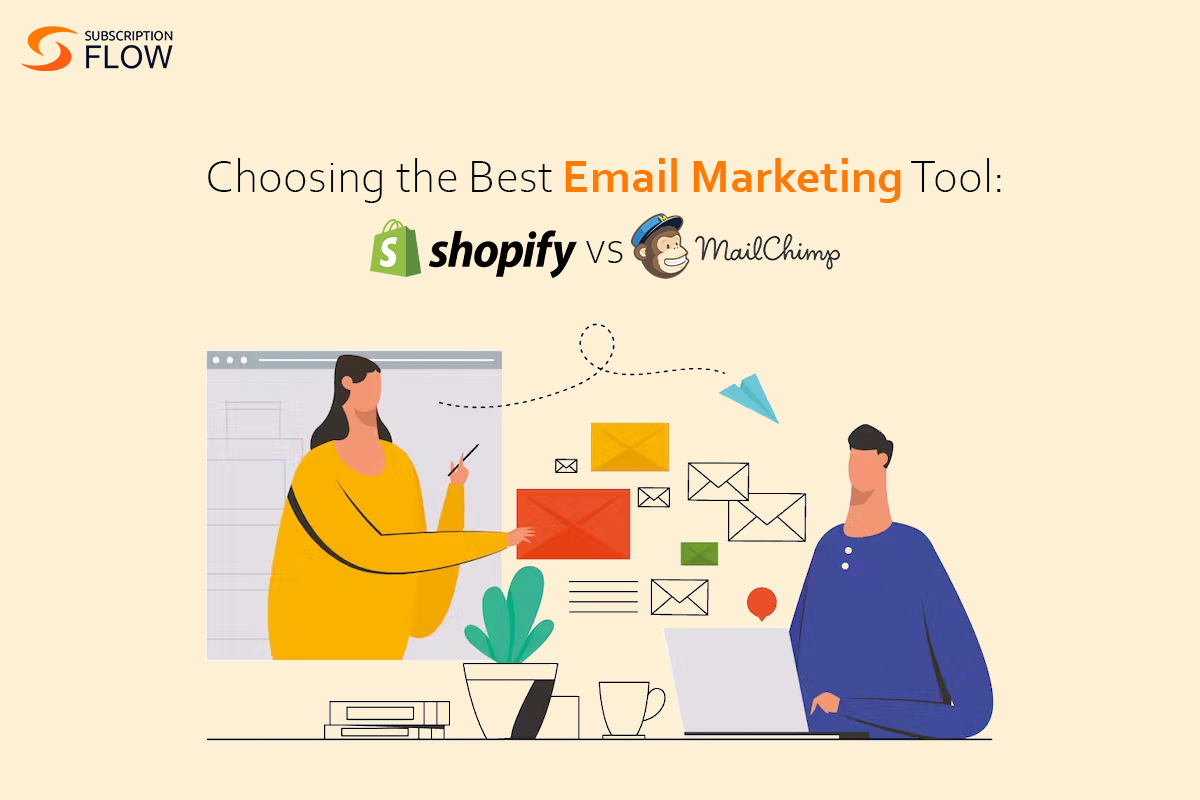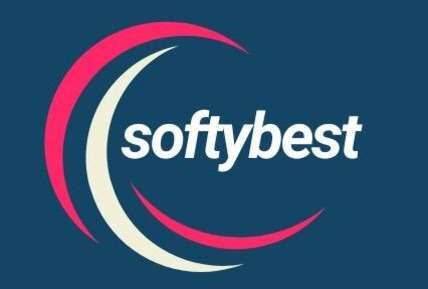Choosing the right email marketing platform can significantly impact your business’s success. Shopify Email and Mailchimp are two popular options that cater to different needs. This article will explore their features, benefits, and drawbacks to help you make an informed decision.
Email marketing is a powerful tool for businesses looking to engage with customers, promote products, and drive sales. With numerous platforms available, Shopify Email and Mailchimp stand out as two of the most widely used options. Shopify Email is integrated directly into the Shopify platform, making it a convenient choice for e-commerce businesses. On the other hand, Mailchimp offers a more versatile solution that can be used across various industries. In this article, we will delve into the key features, pricing, and overall effectiveness of both platforms to help you determine which one is best for your needs.

Source: www.subscriptionflow.com
Key Takeaways
- Shopify Email is ideal for Shopify store owners, offering seamless integration.
- Mailchimp provides a broader range of features suitable for various businesses.
- Pricing structures differ significantly, with Shopify Email being more cost-effective for Shopify users.
- Both platforms offer automation, analytics, and customizable templates.
- Your choice should depend on your specific business needs and marketing goals.
Overview of Shopify Email
Shopify Email is an email marketing tool designed specifically for Shopify users. It allows store owners to create, send, and manage email campaigns directly from their Shopify dashboard. This integration simplifies the process of reaching out to customers and promoting products.
Features of Shopify Email
Seamless Integration: Shopify Email is built into the Shopify platform, making it easy for users to access and manage their email marketing efforts without needing to switch between different tools.
User-Friendly Interface: The platform is designed with simplicity in mind, allowing users to create campaigns quickly using pre-designed templates.
Automation: Shopify Email offers automation features that enable users to send targeted emails based on customer behavior, such as abandoned cart reminders and post-purchase follow-ups.
Analytics: Users can track the performance of their email campaigns through detailed analytics, including open rates, click-through rates, and conversion rates.
Cost-Effective: For Shopify users, Shopify Email is a cost-effective solution, especially for those who are already paying for a Shopify subscription.
Pros and Cons of Shopify Email
Pros
- Integrated with Shopify: No need for third-party tools.
- Easy to Use: Intuitive interface for quick campaign creation.
- Affordable for Shopify Users: Pricing is based on the number of emails sent, making it budget-friendly.
Cons
- Limited Features: Compared to Mailchimp, Shopify Email has fewer advanced features.
- Less Flexibility: Primarily designed for e-commerce, which may not suit all businesses.
Overview of Mailchimp
Mailchimp is one of the most popular email marketing platforms available today. It caters to a wide range of businesses, from small startups to large enterprises. Mailchimp offers a comprehensive suite of marketing tools, including email marketing, landing pages, and social media advertising.
Features of Mailchimp
Versatile Templates: Mailchimp provides a vast library of customizable templates, allowing users to create visually appealing emails that align with their brand.
Advanced Automation: The platform offers sophisticated automation features, enabling users to set up complex workflows based on customer interactions.
Segmentation: Mailchimp allows users to segment their audience based on various criteria, ensuring that the right message reaches the right people.
Comprehensive Analytics: Users can access in-depth analytics to measure the success of their campaigns and make data-driven decisions.
Integrations: Mailchimp integrates with numerous third-party applications, making it a flexible choice for businesses that use multiple tools.
Pros and Cons of Mailchimp
Pros
- Feature-Rich: Offers a wide range of tools beyond email marketing.
- Highly Customizable: Users can create tailored campaigns to suit their audience.
- Strong Analytics: Provides detailed insights into campaign performance.
Cons
- Pricing: Can become expensive as your subscriber list grows.
- Learning Curve: The platform may be overwhelming for beginners due to its extensive features.
Comparing Pricing Structures
When choosing between Shopify Email and Mailchimp, pricing is a crucial factor to consider.
Shopify Email Pricing
Shopify Email pricing is straightforward. Users can send up to 10,000 emails per month for free. After that, the cost is based on the number of emails sent, making it a cost-effective option for Shopify store owners.
Mailchimp Pricing
Mailchimp offers a tiered pricing structure based on the number of subscribers and features. The free plan allows users to send up to 500 emails to 500 subscribers, but advanced features require a paid plan. As your subscriber list grows, the costs can increase significantly, making it less budget-friendly for larger businesses.
User Experience and Interface
Shopify Email User Experience
Shopify Email is designed for ease of use. The interface is clean and intuitive, allowing users to create campaigns quickly. The integration with the Shopify dashboard means that users can access customer data and product information seamlessly.
Mailchimp User Experience
Mailchimp's interface is more complex due to its extensive features. While it offers powerful tools, the learning curve can be steep for new users. However, once familiar with the platform, users can take advantage of its advanced capabilities.
Automation Features
Shopify Email Automation
Shopify Email provides basic automation features, such as sending welcome emails, abandoned cart reminders, and post-purchase follow-ups. These features are essential for e-commerce businesses looking to engage customers effectively.
Mailchimp Automation
Mailchimp excels in automation, offering advanced workflows that can be triggered by various customer actions. Users can create personalized journeys for their subscribers, enhancing engagement and driving conversions.
Analytics and Reporting
Shopify Email Analytics
Shopify Email offers essential analytics, including open rates, click-through rates, and conversion rates. This data helps users understand the effectiveness of their campaigns and make necessary adjustments.
Mailchimp Analytics
Mailchimp provides comprehensive analytics, allowing users to track campaign performance in detail. Users can access reports on audience engagement, revenue generated, and more, enabling data-driven decision-making.
Customer Support
Shopify Email Support
Shopify offers customer support through various channels, including live chat, email, and a comprehensive help center. Users can find answers to common questions and receive assistance when needed.
Mailchimp Support
Mailchimp provides customer support through email and a knowledge base. However, users on the free plan may have limited access to support, which can be a drawback for those needing immediate assistance.
Use Cases for Shopify Email and Mailchimp
When to Use Shopify Email
- If you run a Shopify store and want a simple, integrated solution for email marketing.
- If you are looking for a cost-effective option that allows you to send targeted emails based on customer behavior.
- If you prefer a user-friendly interface that requires minimal setup.
When to Use Mailchimp
- If you operate a business outside of e-commerce and need a versatile email marketing solution.
- If you require advanced automation features and detailed analytics to optimize your campaigns.
- If you want to integrate with various third-party applications for a more comprehensive marketing strategy.
Expert Insights
Expert Insights
Dr. Jane Smith, Email Marketing Specialist: “Choosing the right email marketing platform depends on your business model and specific needs. Shopify Email is great for e-commerce, while Mailchimp offers more flexibility for diverse industries.”
Frequently Asked Questions about Shopify Email vs Mailchimp
1. Can I use Shopify Email if I don't have a Shopify store?
No, Shopify Email is specifically designed for Shopify users. If you don't have a Shopify store, consider using Mailchimp or another email marketing platform.
2. Is Mailchimp suitable for e-commerce businesses?
Yes, Mailchimp is suitable for e-commerce businesses and offers various features tailored to online retailers, including product recommendations and abandoned cart emails.
3. How do I migrate from Mailchimp to Shopify Email?
To migrate from Mailchimp to Shopify Email, you will need to export your subscriber list from Mailchimp and import it into Shopify. Ensure that you comply with email marketing regulations during this process.
4. Are there any limitations to using Shopify Email?
While Shopify Email is user-friendly and cost-effective, it has fewer advanced features compared to Mailchimp. Businesses with complex marketing needs may find it limiting.
5. Can I integrate Mailchimp with Shopify?
Yes, Mailchimp can be integrated with Shopify using third-party apps. This allows Shopify users to leverage Mailchimp's advanced features while managing their store.
Conclusion
Choosing between Shopify Email and Mailchimp ultimately depends on your business needs and marketing goals. Shopify Email is an excellent choice for Shopify store owners seeking a straightforward, cost-effective solution. In contrast, Mailchimp offers a more versatile platform with advanced features suitable for various industries.
As you consider your options, think about your specific requirements, budget, and the level of complexity you're comfortable with. Whichever platform you choose, remember that effective email marketing can significantly enhance customer engagement and drive sales.
Explore additional resources, subscribe for more insights, or leave a comment below to share your thoughts!
Watch This Video on Shopify email vs Mailchimp.






